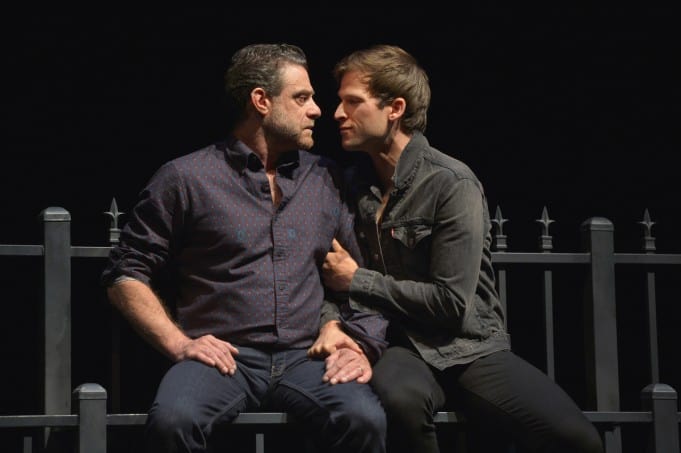Cy Ashley Web reviews The Intelligent Homosexual’s Guide to Capitalism and Socialism with a Key to the Scriptures, a new play by Tony Kushner on stage at the Berkeley Repertory Theatre.
Tony Kushner is one of our last remaining public intellectuals. As such, his most recent play The Intelligent Homosexuals Guide to Capitalism and Socialism with a Key to the Scriptures, aka iHo, might be the most significant new theatre in the past few years. However, with a title that even Kushner calls “unbearably, unforgivably long” and a run time of four hours, I wondered whether Kushner passed his moment and lapsed into a self-indulgence so profound that NY Times reviewer Ben Brantley was correct when he characterized this as a work of “a great conversationalist who keeps talking well after he has made his essential points.”
All the cross talk ebbs and flows with such power that it becomes bigger than any of the lines themselves.
My concerns were entirely misplaced. iHo is one of those one-in-a-lifetime miracles that happened in good part because of the decades of collaboration between Kushner and artistic director Tony Taccone.
This new version is substantially changed from the earlier one, which opened at the Guthrie in 2009, and played in NY in 2010. At the heart of the first two acts are maddening conversations with such non-stop cross talk that you never really hear any through to the end. However, that’s the power that drives this play forward.
An astute observer who sat close to me noted, it’s not about the plot. All the cross talk ebbs and flows with such power that it becomes bigger than any of the lines themselves. Exquisite care was taken with which voices were speaking and how loudly so that instead of the impenetrable noise of a crowded subway car or irritating voices of people from whom you just have to get away, this dialogue is something you ride on, like surfing. There’s big waves and small waves and you just grab the energy and go with it. This is music as much as dialogue – and it’s why the first two acts just fly by. The gentleman near me was spot on when he noted that the play had to be that long so that the tension created in the first two acts could dissipate, leaving the strangely quieter – and slower conversations for the third act.

While this isn’t entirely about plot, it is about the characters.
We meet the iconic patriarch of the family, Gus Marcantonio (Mark Margolis), who has called together his offspring to let them know that at 72 he’s ready to kill himself and will the family Brownstone to them. His sister, Cleo (Randy Danson), a former discalced Carmelite and member of the Sendero Luminoso, “doesn’t subscribe to systems.” She’s the quiet one, who gets more than her share of the good lines.
MORE STARK INSIDER: ‘The Big Meal’: More than a mouthful at the San Jose Rep
Gus’s son, Pill (Lou Liberatore), is a high school teacher married to Paul (Tyrone Mitchell Henderson), who’s passed up tenure in lieu of being a lowly adjunct because of complications (a recurring word here) with Pill. Empty (from MT – Maria Theresa, played by Dierdre Lovejoy) is angry at Pill because he’s blown the $30K she needed for the baby carried by her hugely pregnant wife on his hustler boyfriend, Eli (Jordan Geiger). Last of Gus’s children is Vito (Joseph J. Parks), who crackles with a brittle rage.
Implausible as it seems, these characters run so true that you could be related to any of them.

Part of why this works so well is that Kushner’s characters don’t get lost in his polemics – or their own, for that matter. Thus, we have Pill, explaining the notions of alienated labor and commodification to his hustler boyfriend Eli, who counters that if “running tricks is selling the alienated self, the question is ‘do you want to fuck the alienated or get fucked by it?’” However, Kushner’s not content with just the belly laughs. Gus is painfully aware of his sham success as a labor organizer, which drives part of his suicidal urge. Such true-to-life characterizations may be why Taccone characterizes this play as being about the death of the left, and a love story about the Marxist theory of surplus value.
Kushner wears his love of ideas and language on his sleeve with honesty and intellectual integrity. With a drama this far-reaching, may he keep this conversation going for decades to come.



